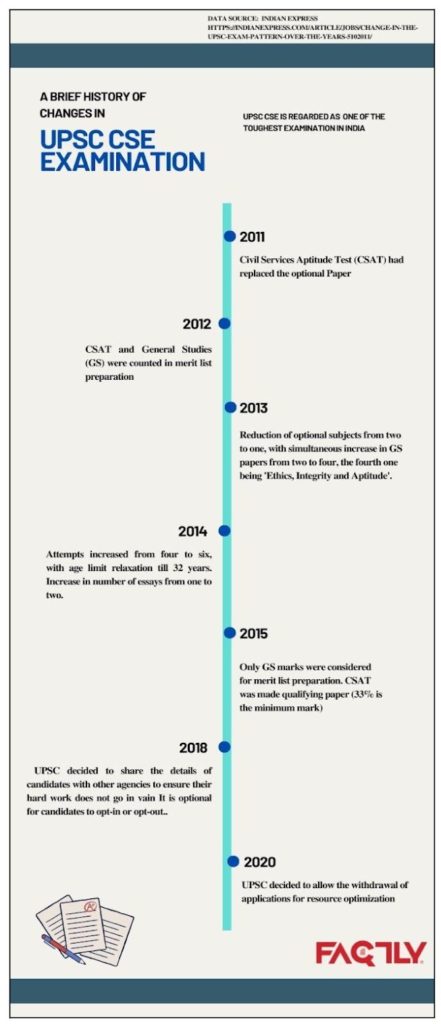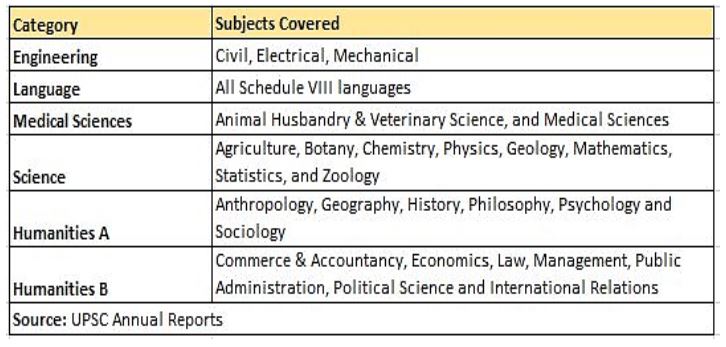Analysis of the data from the UPSC annual reports indicates that the share of engineering degree holders in the final merit list of the Civil Services Examination (CSE) has increased from 31% in 2009 to 63% in 2019. During the same period, the share of candidates with a humanities education background decreased from 44% to 24%. Here is a detailed analysis of the CSE data.
The Union Public Service Commission’s (UPSC) Civil Services Exam (CSE) is undoubtedly the most demanding and sought-after exam in the country. It is the primary mode of recruitment for the positions of civil services both in the Government of India & in State governments. Around thousand vacancies are filled every year, including the much-coveted services like the Indian Administrative Services (IAS), Indian Police Services (IPS), and Indian Foreign Services (IFS). Usually conducted in three phases, the entire examination process and its selection require candidates to undergo more than 30 hours of rigorous testing.
The examination had undergone many changes since its inception. These changes are mostly in the pattern of examination, and a few modifications to the syllabus. Along with the changes in examinations, there are some patterns in the results of the examination. Today’s story looks at the emerging trends and similarities in the examination results. Factly’s earlier story on the trends in UPSC CSE examination till 2013 can be read here.
Caution must be exercised in interpreting these trends as a standard norm as it is possible that these trends are merely coincidental.
Changes in the UPSC examination
No examination is devoid of changes in its recruitment process. The changes could be in the form of examination pattern, syllabus, mode of examination, and eligibility criteria among other things. UPSC’s CSE had also undergone some key changes over the years. The latest change is in 2020 when the UPSC allowed candidates to withdraw their applications. This is done to ease the burden of resources incurred by the UPSC in the examination process and to provide better quality examination centres for candidates. Below is a brief timeline-based overview of the changes to the UPSC CSE examination.

Higher degrees triumph bachelor’s degree in educational background of selected students
Data of the success rate in conversion between the interview & final merit list by education background indicates that candidates with higher degrees have a better success rate than the ones with a bachelor’s degree. From 2012 to 2017, the gap between the success rates between these two is not so significant, whereas, in 2018 & 2019, the divergence in the success rate of these educational backgrounds is more evident.
Candidates with engineering backgrounds overpower other streams in the final selection
We have earlier noted that candidates with higher degrees have a better success rate than those with bachelor’s degrees. Further breaking this down into four major disciplines: engineering, humanities, sciences, and medical science, it is found that candidates from engineering disciplines dominate the final merit list. They account for more than 50% of the final selected candidates, and this share has crossed 60% in recent years. It is also evident that the composition of candidates from other disciplines has also been declining consistently, with humanities dropping from 44% in 2009 to 24% in 2019, medical sciences from 12% to 6% and Sciences from 13% to 7% during the same period. These trends could point out that the service’s recruitment has become more tilted towards technocratic capabilities.
Engineering background dominates in the final selection, but those with a humanities background are better at conversion
Data on the conversion rate of those who attended the interview and those in the final merit list indicates that it is better for humanities than the rest of the disciplines. Barring 2012 & 2013, the conversion rate for candidates with an engineering background has been declining. Similar is the case for medical sciences, except for 2015 and 2016. Candidates with a science background also have shown improvement in their conversion probability in 2019 when compared to 2012. Those with a humanities background have the best conversion rate with more than 40% in recent years.
Female candidates have a better conversion rate than male candidates
If the conversion rate is considered from a gender lens (from interview to the merit list), it is found that female candidates have a better conversion rate than their male counterparts from the interview to merit list stage. The conversion rate of female candidates is around 50% while that of male candidates stands at 36%. This essentially means that 2 in 4 female candidates get selected, while approximately 2 out of 6 candidates get selected among males. The trend from 2009 has been the same, however, the difference in the conversion rates is reducing, from 21 in 2006 to 10 in 2019. The same trend is also be seen in terms of conversion from appearance in mains examination to interview shortlist.
Humanities as an optional category are the most preferred
The UPSC in its annual report, categorizes all the optional subjects into five categories, as below.

As an overall figure, Humanities still hold an upper hand in the candidates’ preferences and their success rate in any particular year. More than 75% of the recommended candidates have Humanities-A and Humanities-B as their optional categories. It is strange that while candidates with engineering backgrounds dominate in the final selection, their preferred optional categories turn out to be Humanities A & B.
If we look at the cumulative data from 2013 to 2019, the success rate for the Medical Sciences category, with 15.2%, is higher than all the other categories. It is followed by Sciences and Humanities-B at 8.6%, Languages at 8.4%, and Engineering at 8.5% and Humanities-A at 7.3%. If we look at the year-on-year success rate trends in these categories, it is observed that there is a marginal improvement in the success rate of candidates with Engineering and Sciences as their optional categories, while Humanities A and Medical Sciences show a slight decline.
Subjects in Humanities-B have a better success rate than Humanities A
Data clearly indicates that candidates tend to prefer humanities and the success rate is also higher in humanities. Further analysis of the data indicates that the subjects from the humanities-B category like Economics, Law, Management, Commerce and Accountancy have a better success rate when compared to the subjects in the humanities-A category. However, the success rates of subjects like Law and Management have been showing a declining trend over the period. Subjects like Sociology, Geography, History, Political Science, and International Relations (PSIR) are maintaining an approximately stable trend in success rate.
Featured Image: Civil Service Examination

